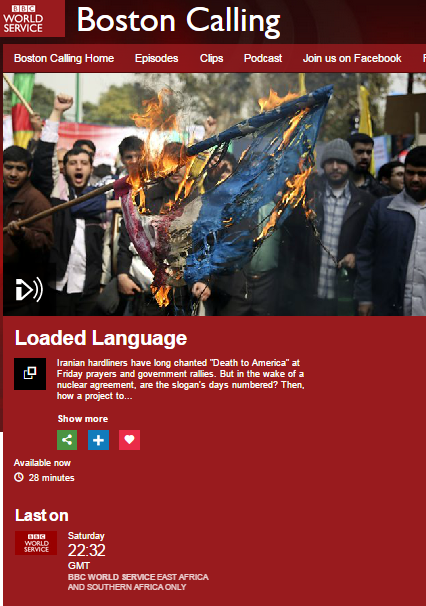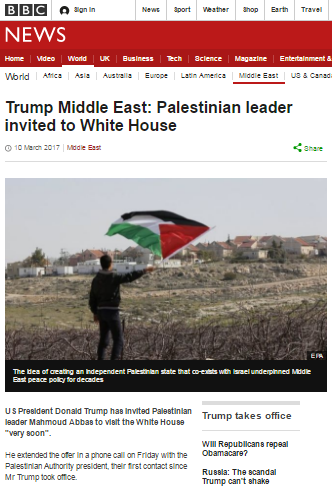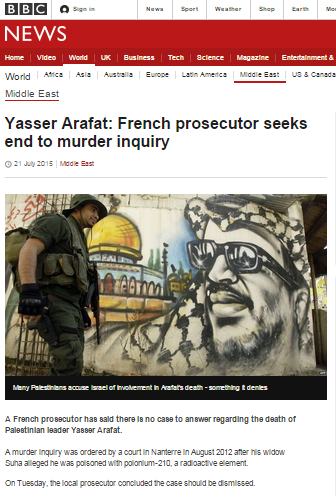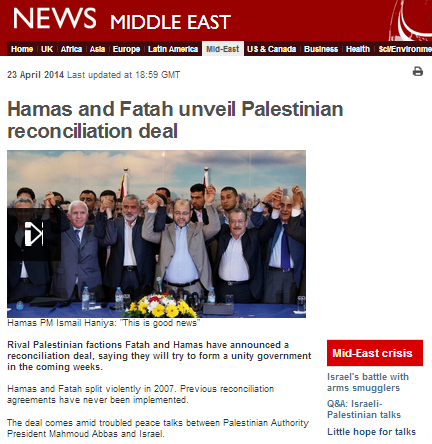A segment heard in a BBC World Service radio programme on August 15th displays similar issues to those evident in the programme discussed in part one of this post. The synopsis of that edition of ‘Boston Calling’ states:
“Iranian hardliners have long chanted “Death to America” at Friday prayers and government rallies. But in the wake of a nuclear agreement, are the slogan’s days numbered?”
The item itself (from 1:00 here) opens with some very clear signposting for listeners from presenter Marco Werman.
“…’yes or no’: that is the stark choice US Congress is facing on the Obama administration’s nuclear deal with Iran. The president laid it out in these terms:
[Obama] ‘Let’s not mince words. The choice we face is ultimately between diplomacy or some form of war – maybe not tomorrow, maybe not three months from now, but soon.’
One thing that keeps coming up in the argument against the nuclear deal is a chant: ‘death to America’. Hardliners in Iran belt it out at Friday prayers and demonstrations so critics here say how can we trust people who regularly call for the death of our country? Here’s what President Obama had to say about that:
[Obama] ‘Just because Iranian hardliners chant ‘death to America’ does not mean that that’s what all Iranians believe.'”
Obviously not, but Werman fails to point out that Obama’s argument can be regarded as redundant as long as Iran is a theocratic regime in which “all Iranians” have scant influence on their country’s policies and actions.
He goes on to introduce journalist Nazila Fathi who recently wrote an opinion piece on the topic which is very similar to her contribution to this programme.
Werman also introduces his own anecdote into the conversation:
“I heard the chant used by the Iranian delegation to an anti-apartheid conference in West Africa of all places in 1987 and a couple of the Iranians seemed to have this little smile on their faces as if they knew it was kind of crazy to wish death on a whole country. Do you think the majority of people, you know, older than you who chanted it actually believed the words they were saying?”
More signposting from Werman comes later on in the segment:
“So has the nuclear deal basically made this phrase obsolete for all intents and purposes?”
Interestingly though, he chooses not to pick up on the following part of Fathi’s answer to his question.
“But I can’t say that this is an empty slogan because as you know a lot of these regimes that rely on propaganda they can use them, they can snowball it into something bigger and take advantage of them for their own benefits.”
So as we see, the take-away message of this item – based on one opinion piece from one journalist – is that a point allegedly raised by “critics” making “the argument against the nuclear deal” is invalid because Iranians never believed what they were chanting anyway and apparently the signing of the nuclear deal has made Iranian regime animosity towards the US “obsolete”.
Again – had BBC audiences been provided with objective critique of the arguments for and against the terms of the JCPOA deal reached last month then this obviously partial item would have been less problematic. However, BBC presentation of that topic has been as monochrome, lacking in curiosity and predictable as its airbrushing of the Iranian regime on other issues.
Related Articles:
Why does the BBC continue to describe Rouhani as a ‘moderate’?
How the BBC whitewashed the issue of women’s rights in Iran




